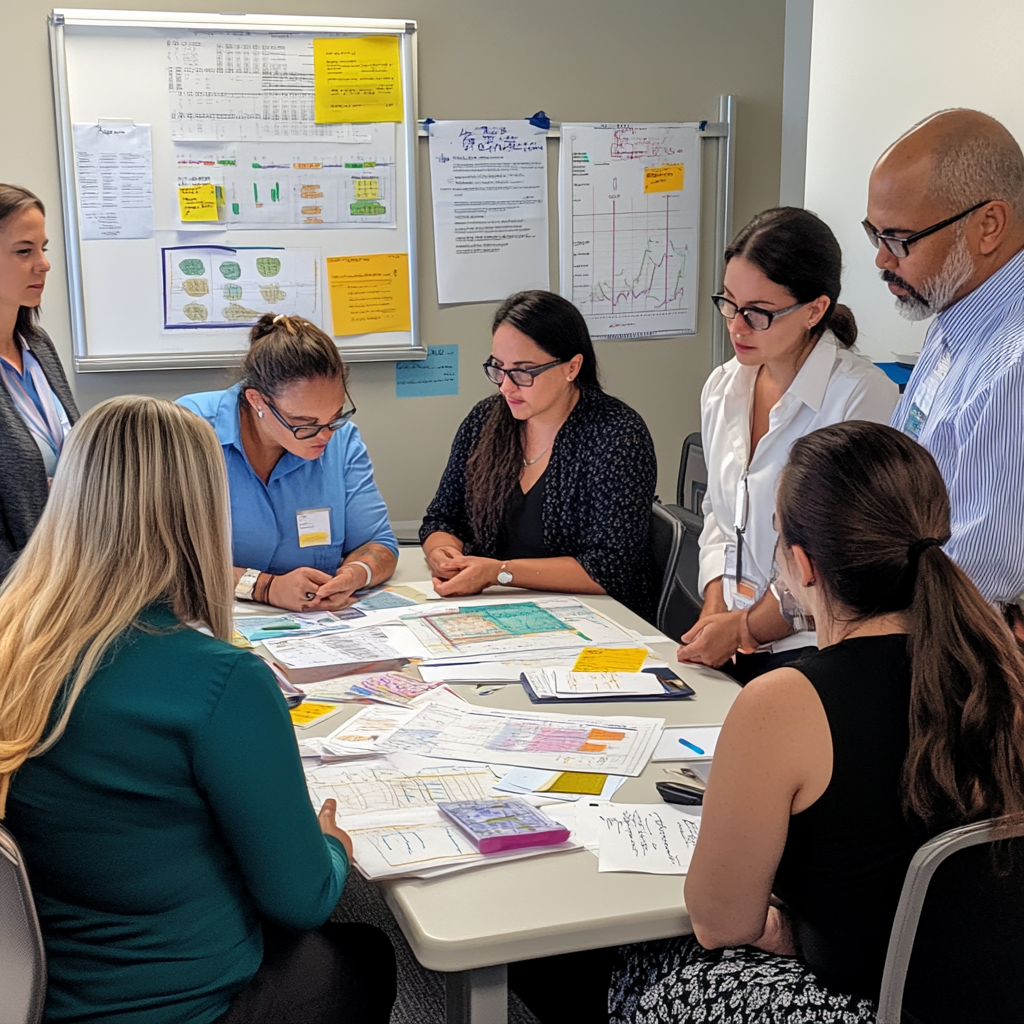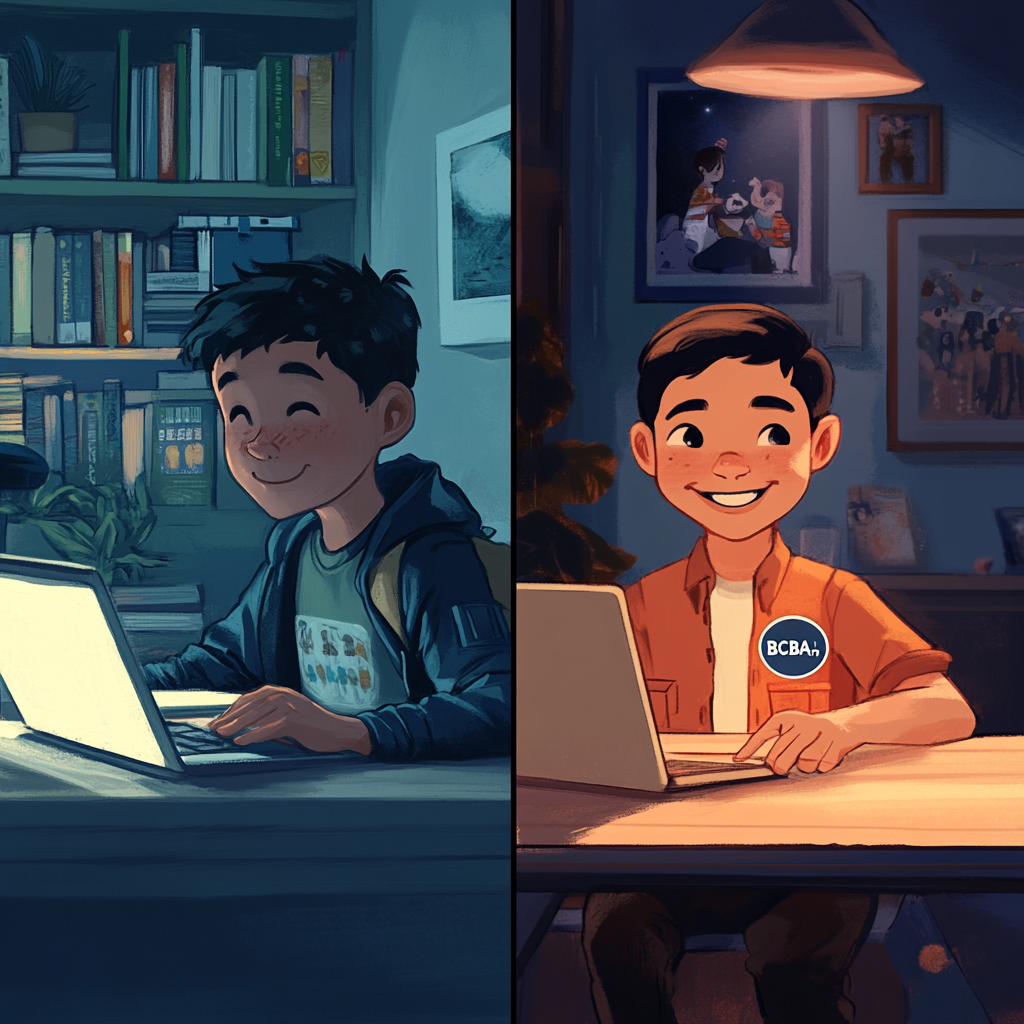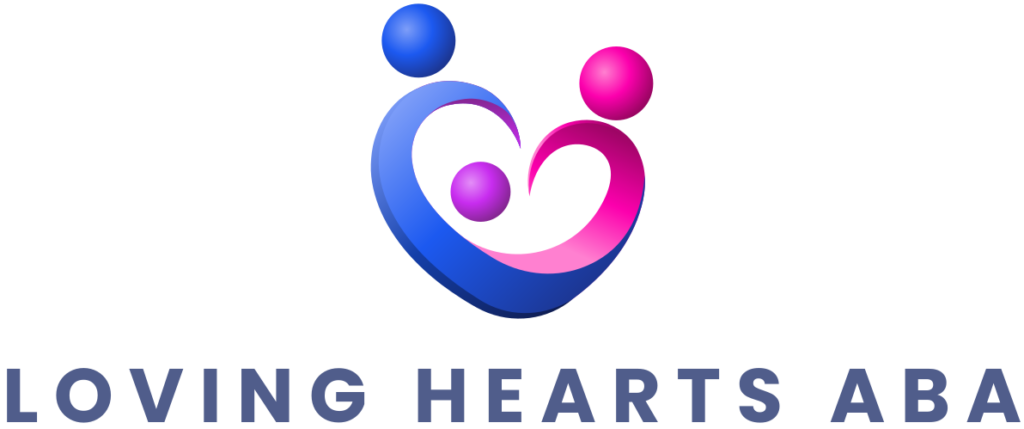At Loving Hearts ABA, we believe in nurturing growth from the ground up. Many of our dedicated Registered Behavior Technicians (RBTs) have taken the courageous and inspiring journey toward becoming Board Certified Behavior Analysts (BCBAs). This comprehensive guide outlines the path from RBT to BCBA, emphasizing the steps, expectations, and support systems available to help you thrive within the field of applied behavior analysis.
Responsibilities of an RBT
 As an RBT, you play a crucial role in delivering behavior-analytic services to individuals with Autism Spectrum Disorder and other developmental needs. Your responsibilities typically include:
As an RBT, you play a crucial role in delivering behavior-analytic services to individuals with Autism Spectrum Disorder and other developmental needs. Your responsibilities typically include:
- Implementing behavior intervention plans
- Providing direct therapy
- Supporting client progress
- Assisting with data collection and behavioral assessments
- Collaborating with supervision of BCBAs
- Supporting behavior reduction strategies to improve daily functioning
RBTs work across various settings, such as schools, homes, and clinics, including those served by Loving Hearts ABA. The impact of an RBT certification goes beyond delivering services — it forms the foundational stepping stone to more advanced roles in the ABA field.
Responsibilities of a BCBA
The BCBA role expands upon the RBT’s responsibilities and requires graduate-level certification. A Board Certified Behavior Analyst is responsible for:
- Designing and modifying behavior intervention programs
- Conducting comprehensive assessments
- Providing supervision of a qualified BCBA or Board Certified Assistant Behavior Analyst (BCaBA)
- Ensuring ethical standards are upheld
- Leading data analysis and applying evidence-based practices
- Addressing challenging behaviors using proactive intervention models
The BCBA’s scope of practice allows them to make decisions regarding intervention strategies, lead teams, and offer guidance based on functional assessments and positive outcomes.
Educational Requirements
Required Degrees
To transition from RBT to BCBA, you must meet the certification requirements set by the Behavior Analyst Certification Board (BACB):
- A bachelor’s degree in a related field (psychology, education, social work, etc.) is the first step
- A master’s degree or doctoral degree in applied behavior analysis, education, or a related field is required to sit for the BCBA certification exam
Accredited Programs
Enroll in ABA programs that meet BACB’s training requirements:
- Look for graduate programs that include the Verified Course Sequence (VCS)
- Many online and on-campus degree programs offer flexibility while preparing you for the field of behavior analysis
- Pursuing a graduate degree through programs that offer opportunities for research and practical application will enhance your ability to move beyond basic technician roles
Gaining Relevant Experience
Supervised Fieldwork
You must complete supervised fieldwork hours under the guidance of a qualified supervisor:
- Two options: 2,000 hours of supervised independent fieldwork or 1,500 hours of concentrated supervised fieldwork
- Must be conducted in accordance with BACB’s ethical considerations and guidelines
Accumulating Experience Hours

- Engage in therapy sessions where you can collect data, design behavior plans, and support behavior change
- At Loving Hearts ABA, we offer hands-on opportunities to build practical experience with real clients
- Receive ongoing supervision and mentorship from highly trained professionals
Certification Process
BCBA Exam Requirements
Once educational and fieldwork requirements are fulfilled, the final step is the BCBA exam:
- Administered by the Behavior Analyst Certification Board
- Comprised of multiple-choice questions covering all domains in the field of applied behavior analysis
Study Tips for the BCBA Exam
- Use study materials aligned with the BACB Task List
- Join support systems or study groups of aspiring BCBAs
- Take practice exams and review frequently asked questions
- Focus on ethics, behavioral interventions, data analysis, and best practices
Maintaining Your Certification
Continuing Education Units (CEUs)
After earning your BCBA certification, maintain it through:
- Earning Continuing Education Units (CEUs) annually
- Attending professional development workshops
- Staying current with best practices in autism therapy and mental health
Ethical Guidelines and Professional Conduct
- Follow the BACB Code of Ethics
- Ensure your work reflects professional conduct and client-centered care
- Receive supervision of a qualified BCBA when required
Continuing Education Requirements
To stay credentialed and compliant:
- Complete all continuing education requirements outlined by the BACB
- Focus on maintaining fluency in topics such as ethics, intervention strategies, new research in ABA services, and updates to the scope of practice
- Seek out advanced education courses and conferences to enrich your clinical perspective
Career Opportunities and Growth
Job Prospects for BCBAs
At Loving Hearts ABA and similar healthcare organizations, BCBAs lead teams in delivering ABA services across various settings. As a BCBA, you can:
- Work in private clinics, school systems, or in-home therapy
- Supervise RBTs and Board Certified Assistants
- Design and evaluate behavior intervention plans
Potential Salary Increase
Moving from RBT to BCBA typically results in a substantial increase in salary:
- BCBAs earn a significantly higher average salary, especially in Baltimore and surrounding regions
- With higher education and leadership roles, you can expect long-term growth and financial stability
- Nationwide, the demand for BCBAs is rising, and professionals with a graduate degree often secure positions with higher salaries and added benefits such as relocation stipends, flexible scheduling, and research opportunities
RBT Certification: Your First Step to a Bigger Future
The RBT certification is a gateway to advanced roles within the ABA field. As you work as an RBT, you’ll:
- Learn foundational skills in behavior reduction, client interaction, and ethical treatment delivery
- Understand what it means to function within the scope of practice of an RBT and when to seek guidance
- Develop a relationship with your qualified supervisor who will mentor you through each step
How Does an RBT Become a BCBA?
- Start by working toward your RBT certification, then pursue a bachelor’s degree followed by a graduate degree
- Accumulate supervised fieldwork while continuing your work as an RBT
- Transition into more advanced responsibilities as you prepare for the BCBA certification exam
At Loving Hearts ABA, we champion our team members and celebrate each RBT become a leader in the ABA field.
Challenges and Rewards
Common Challenges
- Balancing fieldwork experience, academics, and personal commitments
- Understanding complex intervention strategies
- Preparing for a rigorous certification process
- Navigating the evolving scope of practice while gaining experience
The Rewards of Being a BCBA

- Making a tangible difference in clients’ quality of life
- Collaborating with family members and schools to promote inclusive support
- Building a lasting, impactful career within the field of applied behavior analysis
- Achieving positive outcomes for clients with challenging behaviors, through strategic interventions
Resources for Aspiring BCBAs
Study Materials and Courses
- BACB-approved study materials and course providers
- Online platforms that offer exam prep and mock tests
- Continuing education offered through ABA programs and professional bodies
Professional Organizations and Networks
- Join the Association for Behavior Analysis International (ABAI)
- Engage with local networks supported by Loving Hearts ABA
- Connect with peers for accountability and professional growth
Conclusion
Final Thoughts
Becoming a Board Certified Behavior Analyst is both a challenging and rewarding path. At Loving Hearts ABA, we support our team members as they transition from RBT to BCBA, offering hands-on experience, guidance, and encouragement every step of the way.
Encouragement and Motivation
If you’re a current RBT dreaming of greater impact, know that your journey to become BCBA is entirely achievable with solid foundation, further education, and consistent mentorship. You are not just advancing your career — you’re changing lives.
Let Loving Hearts ABA be your partner in professional growth. Together, we rise — from RBT to BCBA.
